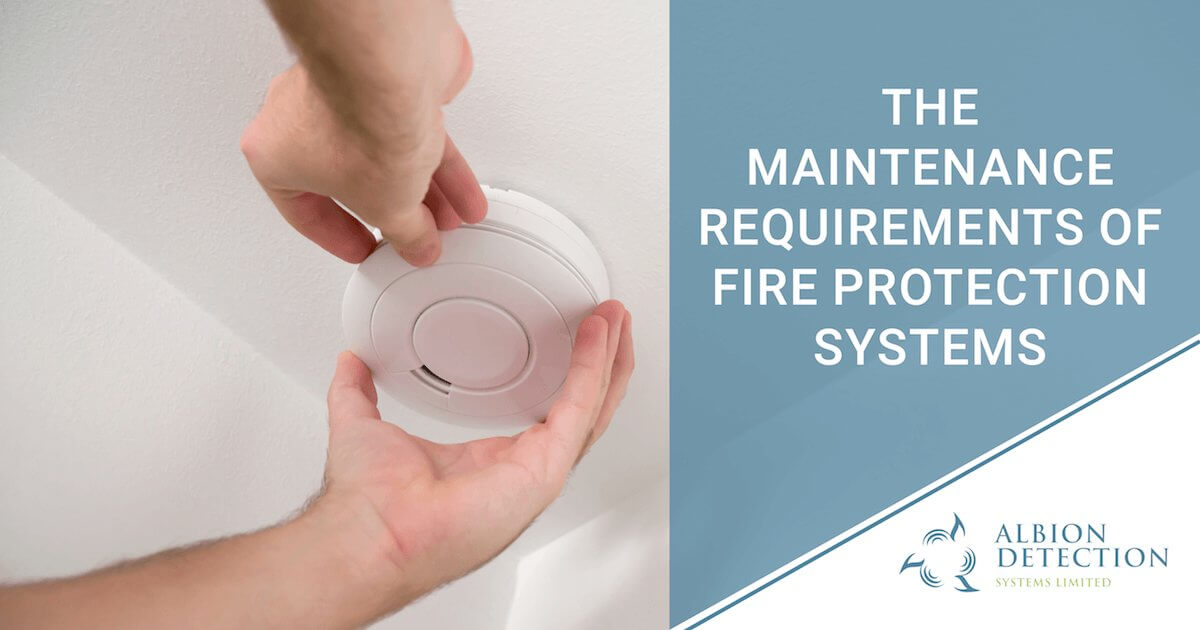
The Maintenance Requirements Of Fire Protection Systems – Albion Detection Systems
Fire protection maintenance ensures most fires are preventable, and one of the ways of helping to avoid your premises suffering fire damage is to perform regular maintenance of your fire protection systems.
Once you’ve had your fire protection systems professionally installed, the very last thing you want is for them to falter once you truly need them.
High-quality fire protection maintenance is, therefore, a cornerstone of good practice, as well as one of the key aspects of adhering to fire safety regulations.
This guide to maintaining your own fire protection systems should help shed light on the frequency and methods of checking your business equipment, helping you safeguard your building from the risk of fire.
Fire protection Maintenance: Conducting Daily Checks
Your main firefighting kit and escape routes should be subject to a daily check at close of business, to ensure fire doors are free of obstruction, and escape routes clearly signposted.
These daily checks should also include everyday housekeeping such as removal of clutter and rubbish, to avoid unnecessary fire risks.
Your Daily Fire Maintenance Checklist
Each day, remember to check:
- Flammable materials and debris are securely removed or placed in their rightful place as decided during your fire risk assessment.
- Electrical sockets, fire doors and escape routes are clear and unobstructed.
- Escape routes are signposted clearly in case of emergency.
In standard practice and dependent upon the size and scale of your company, these checks may not need to be recorded.
However, you may wish to assign a staff member to ensure they are carried out each day.
Your Weekly Fire Maintenance Checklist
Your weekly checks on fire prevention equipment should be more thorough.
These will include significant evaluations of kit such as your fire alarms, fire doors and sprinkler systems, which may or may not require the assistance and oversight of a professional company.
These checks will include:
- Making sure your fire alarm system is still fully functional.
- Assessing whether any adaptations are required to your existing fire safety policy and whether any new risks have presented themselves.
- Continuing with the daily checks, but this time documenting any findings so as to build stronger fire safety within your premises

Your Monthly Fire Maintenance Checklist
Your monthly maintenance checks should be even more thorough and in-depth, so it is recommended that companies rely on the support of their installer or trusted maintenance company to assist with:
- Checking on all fire alarms and smoke alarms.
- Ensuring any advanced features (wireless alarms etc.) are in correct working order.
- Assessing the continued effectiveness of any electronic release mechanisms in escape routes, checking fire doors and internal self-closing fire doors.
Specialist Maintenance Requirements
Some areas of your fire protection require special maintenance and annual yearly or six monthly servicing as part of your responsibilities as an owner to fire protection.
They include:
Firefighting Equipment
It is a legal requirement that your firefighting equipment, including fire extinguishers and all associated apparatus, are maintained to a high standard of effectiveness, and clearly signposted.
The types of fire protection system and safety equipment you have installed will differ depending on your company size, sector and location, but all kit must be assessed routinely.
Fire extinguishers must be checked for signs of tampering, and undergo an annual maintenance test carried out by a ‘competent’ person.
Fire Alarms
By UK law, businesses must have their fire alarms serviced every six months as standard, with working alarm call points beside the exit route on each floor – enabling anyone on the premises to alert the rest of the building to the fire risk.
Depending on the complexity of your fire alarm, you may require help with maintaining it in the shorter-term, as simpler fire alarm systems are rarely suited to companies which must protect larger numbers of staff.
Basic requirements for your fire alarms include the need for it to be clearly audible when ‘triggered’, throughout all areas of your workplace.
Your fire alarm maintenance team can help you identify what to look out for and assist with your longer-term maintenance goals and needs, in accordance with legal requirements and compliance with fire safety law.
Emergency Lighting
Some companies choose to install emergency lighting to help illuminate the escape route and help occupants of the space find the right equipment to fight the fire.
This lighting can also help to reduce panic and provide a clearer picture of what’s happening.
Your emergency lighting needs to be tested yearly by law (simply turned on and off) and it is recommended that this aspect of your fire safety protection undergoes a full service every year.
Sprinklers and Fire Dampers
Popular with industrial and warehouse environments, your sprinkler or fire damper system requires minimal maintenance if installed by professionals, but should nonetheless be subject to a yearly test and maintenance check.
Fire Safety Signs
These are often overlooked by businesses, but most companies benefit from at least 2-3 signs, no matter how modest their premises, to remain legally compliant.
A Fire Action Notice explains in clear terms how anyone present should proceed in the event of a fire, and a Fire Extinguisher ID sign will explain the location of your primary manual fire-fighting equipment, as well as how to use them.
It is extremely important to ensure these aspects of your fire safety plan are carefully monitored and remain correctly placed and clearly displayed.
Emergency Procedure
One of your most valuable fire protection systems is your company’s emergency procedure.
Running through this at regular intervals, including understanding what to do in a fire drill, is essential.
Your escape routes must also be maintained with as much care as any other aspect of your fire protection, ensuring they remain obstruction-free and fit for purpose.
Ad-Hoc Checks
There may be times when you need to organise a check on your fire safety kit outside of the usual maintenance times.
If you find your fire alarm beeping without just cause or suspect your extinguishers or other equipment might have been tampered with, then you can call for professional assistance with your maintenance.
Official guidelines for your maintenance checks are available via the Gov.uk website.
Ready To Get Fire Maintenance Focussed?
Find out more about fire protection, your responsibilities as a business owner and your fire safety system options in our dedicated fire protection guide for commercial premises, or contact us to find out more, or book your free no obligation Fire Protection Consultation



